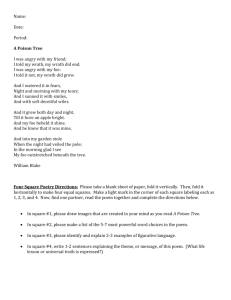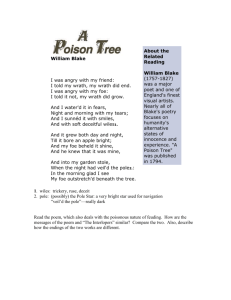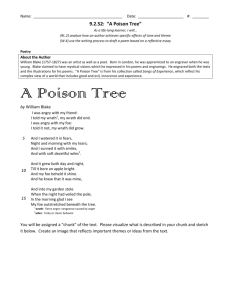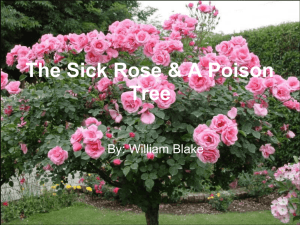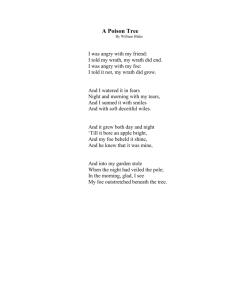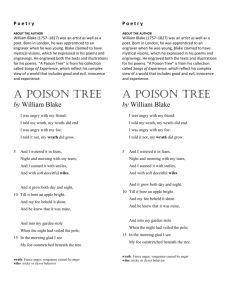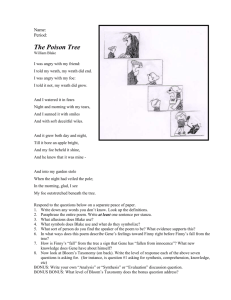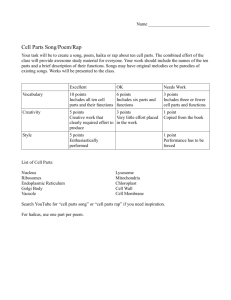A Poison Tree Analysis: Themes & Forgiveness
advertisement
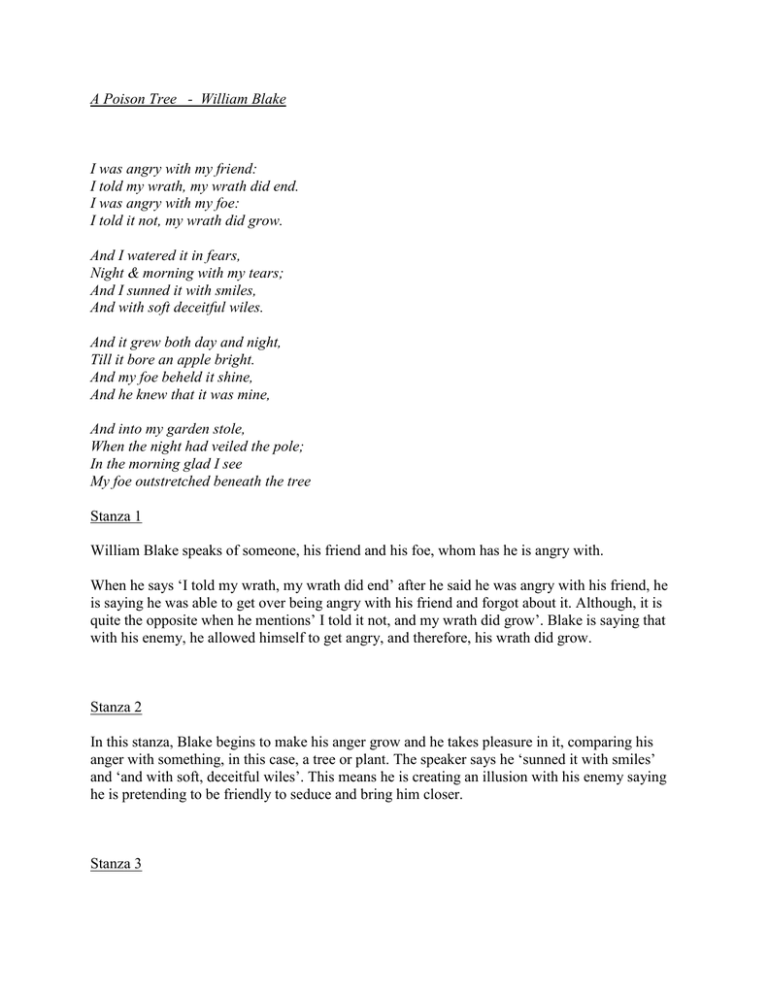
A Poison Tree - William Blake I was angry with my friend: I told my wrath, my wrath did end. I was angry with my foe: I told it not, my wrath did grow. And I watered it in fears, Night & morning with my tears; And I sunned it with smiles, And with soft deceitful wiles. And it grew both day and night, Till it bore an apple bright. And my foe beheld it shine, And he knew that it was mine, And into my garden stole, When the night had veiled the pole; In the morning glad I see My foe outstretched beneath the tree Stanza 1 William Blake speaks of someone, his friend and his foe, whom has he is angry with. When he says ‘I told my wrath, my wrath did end’ after he said he was angry with his friend, he is saying he was able to get over being angry with his friend and forgot about it. Although, it is quite the opposite when he mentions’ I told it not, and my wrath did grow’. Blake is saying that with his enemy, he allowed himself to get angry, and therefore, his wrath did grow. Stanza 2 In this stanza, Blake begins to make his anger grow and he takes pleasure in it, comparing his anger with something, in this case, a tree or plant. The speaker says he ‘sunned it with smiles’ and ‘and with soft, deceitful wiles’. This means he is creating an illusion with his enemy saying he is pretending to be friendly to seduce and bring him closer. Stanza 3 ‘And it grew both day and night’ and ‘til it bore an apple bright’ are meaning that his illusion with his enemy is growing and growing until it became a strong and tempting thing. His illusion has a metaphor and it is an apple. After, his foe believes it shines, which means he thinks it’s true and means something, and takes Blake illusion seriously. ‘And he knew it was mine’ suggests that he really thinks Blake is his friend. Stanza 4 Being the last stanza, Blake needed to come up with a conclusion. He has used the two lines ‘in the morning glad I see’ and ‘my foe outstretched beneath the tree’ to say that his foe finally fell to his tempting illusion and metaphorically, consumed his poison apple and died. So, obviously, his malicious intentions were hidden behind illusion and he prevailed over his enemy. A Poison Tree By William Blake Introduction Although Blake did not always do so intentionally, in this specific poem he chose to rhyme. Blake wanted to dispute values associated with Christianity such as forgiveness because he felt that the religion does not always make sense. Because the religion made little sense to him, through his poetry and prose he was able to form his own opinions about it. For example, by using the tree and the apple in A Poison Tree as a metaphor he was able to give his opinion about forgiveness, which will be further explained. In each poem, similar to A Poison Tree, he shows his view through experience and actions. The state of experience in this specific poem is forgiveness. Blake describes an individual trying to understand and act on the his feelings and the lyrics of a song describe a similar situation. Specifically by comparing and contrasting the song, The Heart of the Matter, by India Arie, Blake's views become apparent. The reason I know this song is because my mom used to love this song and would play it whenever I was in the car with her. It is a fairly recent song that was originally written by Don Henley in his album title The End of Innocence. This was done in 1989. India Arie remade the song in 2006 on her album title Testimony: Vol. 1, Life & Relationship. The genre of Arie’s music is neo-soul and she used vocals, piano and guitar as instrumentals in the song. Theme - Forgiveness Almost immediately upon reading A Poison Tree, the meaning of The Heart of the Matter by India Arie came to mind because it has the same basic message. The narrator of the poem refers to his own personal experience, he was angry with a friend, let the friend know that he was angry. But, even though he had let his “foe” know he had not done so entirely. Only a small part of the anger that the narrator had felt left when he told his friend of the issue. However, the moral is that when you do not share your feelings your bad feeling will continue to grow. According to Heims, the wrath that is mentioned within the first two lines of the poem represents the tree that has been poisoned by the narrator’s own mistakes. Heims also stated that Blake interpreted that one of Christ’s message to the people was the concept of forgiveness and in order to end one “wrath” they must forgive their foe’s or flaws. His opinions and beliefs in Christianity were heavily weighed upon in this poem. The next two lines show how the narrator dealt with anger. He chose to ignore it, or pretend it didn’t exist instead of deal with the situation. When people choose not to share how they feel about a situation, the situation becomes worse to deal with. The emotion will stay in your body—it is always better to get your feelings off of your chest in order to move past them. The lesson that Blake is trying to get across is that you shouldn’t hold back on what you feel or it will probably get worse as did the tree growth. Christianity always asks for us to forgive but it might not always work out this way. As a result of the forgiveness the poisonous apple grew and the foe was punished with death. Compare and Contrast Due to India Arie's prefered genre of music, the poem had a slightly darker tone but the instruments in the song were appropriate for any feeling of forgiveness. The song had points of melancholy and this was represented by the piano and guitar that was mentioned earlier in the song. The words of the poem was very direct and the narrator was satisfied with what the apple had done to his ‘foe’. This was represented by the lines; ‘In the morning glad I see; My foe outstretched beneath the tree’ (Blake, A Poison Tree). The song had the same type of resentment toward the foe because she was bitter about a past relationship and she ended in the same type of satisfaction. When India Arie writes, “the more I know, the less I understand” it shows the same amount of confusion that was present in a Poison Tree. But, India Arie did not seek revenge. Instead she was forgiving to her foe rather than getting her foe as the narrator in A Poison Tree. India Arie wanted to find happiness and had ‘the ashes scatter’. She wanted to put the relationship to rest rather than cause harm. Also, in the song, it talks about the anger of a past romantic relationship—the narrator and the foe in “A Poison Tree” were not romantically involved, only a relationship between friends. The song appropriately relates to the poem because it talks about anger in a relationship that eventually leads the writer of the song to realize that “it’s about forgiveness” rather than have one “filled with rage” at another person (India Arie,The Heart of the Matter). A Poison Tree was about a different type of relationship than this particular song was but it still can connect the two. The poem was about the anger in a relationship as well and the narrator was angry with the foe to the point where his metaphorical poison tree grew a poison fruit. The ‘poison tree’ in the poem repressed the anger and it led to its destruction. In the song too, it speaks about how the writer is weak willed and has a heart that is shattered all due to the actions of another person. In both the song and the poem, the significant other in their relationship created unwanted emotions. A similarity between both the song and the poem is that the wording was simple and direct to understand. Also, both pieces of writing include lines of rhyming words. The poem and the song were organized in Stanzas. The only difference was not in the physical text, but in the meaning. The ‘poison tree’ grew to a point where it was uncontrolled and the song ended with the writer able to realize that she must forgive and accept the situation rather than allow the anger to have an impact on the person that caused the emotion.
